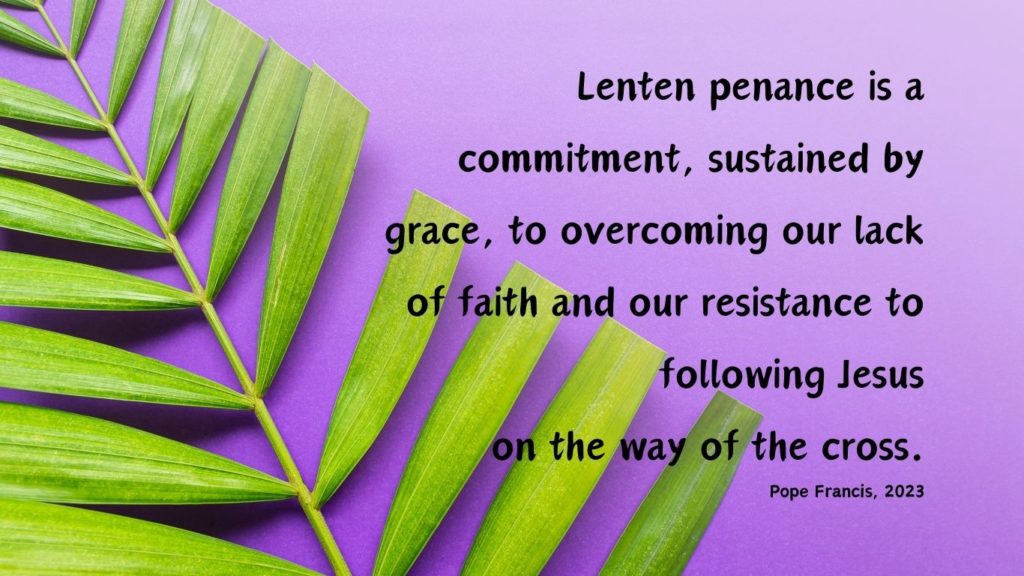Some Thoughts About Making Your Lenten Observance Measure Up
When I was a kid, back when families typically had one television and that was the only venue for visual programing in a home, my younger sister gave up watching Batman, her favorite weekly show, for Lent. This was a new concept in our family – we had always been instructed to think of a much-loved edible treat that we would forego for 40 days. But Batman was, for our Lenten pioneer, a tough sacrifice; once Lent was over that year, I have no doubt that she had developed more grit than the caped crusader himself.
Since then, I’ve noticed more divergence from the old give-up-your-favorite-food way. “New” can be good, but not always and not always completely. Batman aside, it seems like Lenten practices have frequently become more muddled, more “Whoa, easy-does-it.” For many, Lent has become a time for some vague attempt at trying-to-be-a-better-person instead of boldly embracing and wholeheartedly entering into the season’s call to three distinct practices – praying, fasting, and almsgiving.
For example, for years I’ve been hearing and reading about different ways to “do” Lent. The suggestions are sometimes headlined as New, Intriguing, Enlightened, Creative, or Unique. Sometimes they’re touted as ways to become a “new you” in 40 days by such things as losing weight, starting an exercising routine, clearing out the clutter in your home, or, trying to be nicer to people.
To be fair, many ideas are undoubtedly well-intentioned and can be fruitful. They suggest practices – both the addition of good and subtraction of bad – that can help bring a person closer to God. So far, so good, but I’m still questioning whether it’s good enough.
Pope Francis said “Lenten penance is a commitment, sustained by grace, to overcoming our lack of faith and our resistance to following Jesus on the way of the cross.” 1 The Catechism of the Catholic Church (CCC) defines the 40-day season that begins on Ash Wednesday and ends at sundown on Holy Thursday as “the primary penitential season in the Church’s liturgical year, reflecting the forty days Jesus spent in the desert in fasting and prayer.”
Imagine for a moment, our struggle to make it through a day with limited sustenance. (As one of my daughter’s says, “You know it’s Ash Wednesday when you’re planning what to have for dinner at 7:30 a.m., eating it at 4 p.m., and turning in for the night at 6:45.”) Then compare our sacrifice to more than a month of hunger pangs. In a desert. Accompanied by a relentless devil and his taunts.
While such a stringent practice is far beyond the Church’s directive, not to mention beyond most people’s capabilities, Lent should still reflect intentionality and intensity. It’s a pivotal period, a special and solemn time of year set aside for recognizing where we have distanced ourselves or turned away from God, responding with appropriate sorrow and repentance for that realization, and then re-orienting ourselves to Him. We take stock and take action for a continued renewal and deepening of our relationship with the Lord.
The Church provides three tools to help us in this journey toward Easter’s Alleluia – prayer, almsgiving, and fasting. Those three pillars – all three – provide a sturdy foundation for a deeper communion with God, greater compassion for our neighbor, and increased freedom from a reliance on (and often a distorted relationship with) the pleasures of this world. The particulars for each are largely left for us to decide upon – and that’s a good thing, as there is no one-size-fits-all for individuals uniquely and wondrously made. But like other occasions of free choice, it’s a better thing if we put considerable thought and determination into our aims, options, and selections. From there, we can make concrete decisions about what to do for each pillar (keeping in mind that “trying” to do something is not a commitment), and about how it will be measured (because, like any goal, we need to be able to know whether or not we actually carried through with the plan.)
Likewise, as heads of families, we need to guide our children in the fullness of Lent – not only by demonstrating our commitment, but also by adapting all three pillars to their ages and capabilities. For some ideas on how to help little ones enter into the season, click here.
~~~
1Pope Francis, Rome, Saint John Lateran, 25 January, 2023, Feast of the Conversion of Saint Paul

